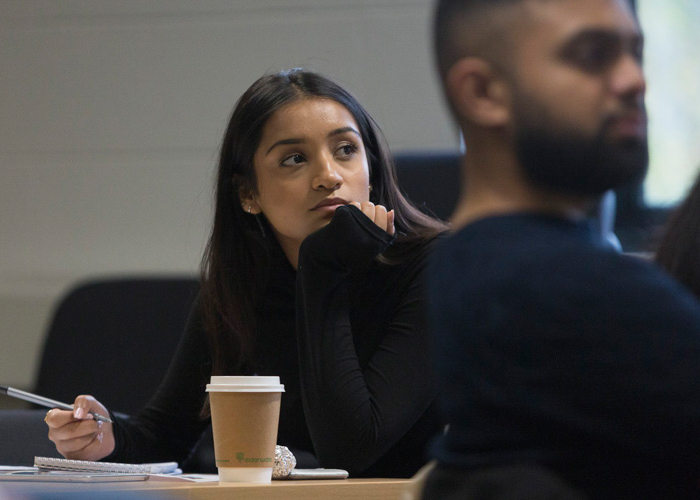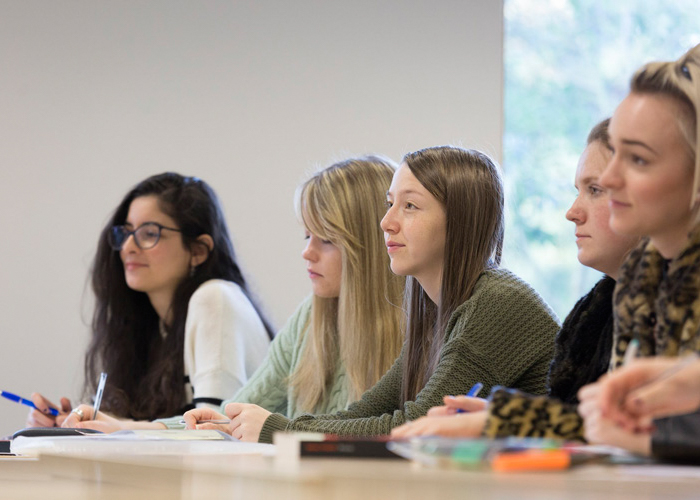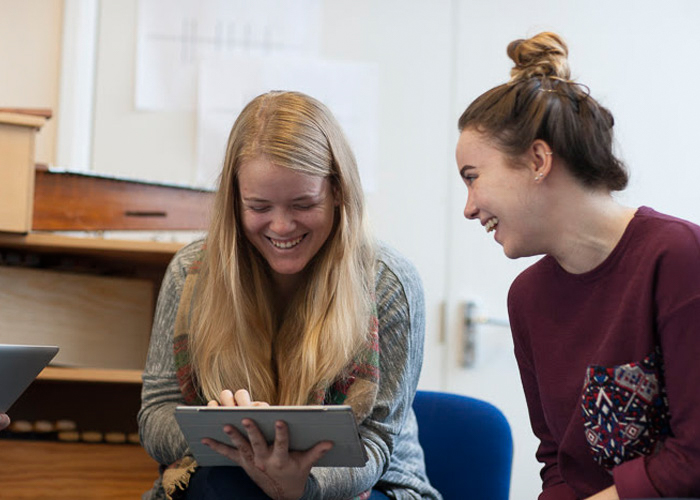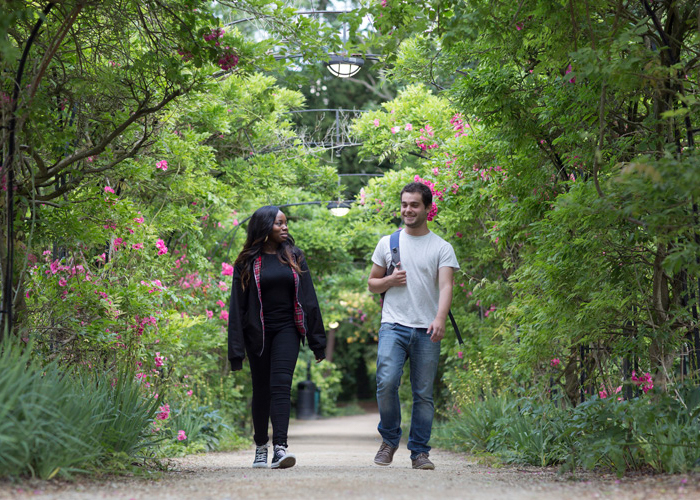Discover the intertwined narratives of literature and journalism, allowing you to analyse how language and storytelling have been used to document fiction and non-fiction work. Roehampton has been ranked 5th best in London for English (The Guardian League Table 2024).

Entry Tariff
112 UCAS points (or equivalent)
Foundation Year entry: 64 UCAS points (or equivalent)
UCAS Code
PQ53
PQ54 (if choosing Foundation Year)
Duration
3 years (full-time)
Start date
September 2024
Degree Type
BA (single honours)
Modules
This course is offered as a degree with foundation year – a four-year programme which provides an additional foundation year at the beginning of the degree, that will give you academic and practical experience, as well as the skills you need to ensure you are equipped to successfully complete your chosen degree.
£2,000 Foundation Scholarships for all home students
Find out more about our degrees with a foundation year
These modules are those we currently offer for 1 year (full time) and may be subject to change.
Visual Storytelling (20 credits)
Journalists and the World (20 credits)
Discovering Literature (20 credits)
Journalism in the Digital Age (20 credits)
Questioning the Canon (20 credits)
Creative and Professional Writing (20 credits)
Why this course
Roehampton has been ranked 5th best in London for English (The Guardian League Table 2024).
Experience a dynamic, contemporary curriculum working with leading experts.
Push yourself further with real-world assignments including digital portfolios, research project presentations and practical assessments.
We offer hands-on, practical modules - learn the basics of news reporting and the emergence of new media, production of magazines and multimedia packages.
Skills

This English and Journalism programme combines aspects of BA English Literature and BA Journalism to create a contemporary blend of analytical skills. Our priority is ensuring that you graduate with a professional skillset. This includes:
- Being a sophisticated reader of literary and journalistic texts and refining your professional reading, editing, and writing skills.
- Becoming adept at switching your style to suit different communicational and professional contexts.
- Developing skills in research and analysis of texts, problem solving, digital content creation, journalistic practice, and copywriting.
- Getting hands-on experience with our in-house publisher, Fincham Press, as well as getting involved with our literature, journalism, and creative writing society and wider school events.
- The option of developing creative non-fiction writing skills alongside your literary ones.
How you'll learn
Experience a dynamic, contemporary curriculum working with leading experts.
You will evaluate literary and journalistic texts through coursework made up of essays, presentations, creative options and digital portfolios of your choosing. Working in both small groups and individually, you’ll enjoy a mix of lectures and seminars as you work through progressive modules on topics such as:
- Visual Texts and Storytelling.
- The Journalist's Relationship to the Wider World.
- Journalism in the Digital Age.
- Creative Non-fiction and Professional Writing.
- The Role of Literature and Print in the Contemporary Media Landscape.
Throughout the course, you’ll be supported by a dedicated and passionate team of lecturers and sector professionals.

How you'll be assessed

Push yourself further with real-world assignments that get you ready for the world of work. Throughout the course, you’ll experience a wide range of assessments that enhance your understanding, your critical and creative thinking, and your practical skills, while giving you a taste of professional practices within the workplace. These include:
- Digital portfolios.
- Research project presentations.
- Critical and reflective essays.
- Practical assessments involving research and data collection.
- Creative and non-fiction writing.
Why did our past students study BA English Literature at the University of Roehampton?
“The reason why I chose to study English literature specifically at Roehampton was down to the teaching staff I met at the time and also the positive feedback I got on open days from other students. The best thing about studying at Roehampton was the support I had from amazing lecturers. Everyone was so approachable and I never felt that I couldn’t just go and knock on a door for help.” - Saara Ismail Mahomed, BA English Literature
“I knew the standard of teaching was very high. The principal reason I chose Roehampton over other London universities […] was that the programme and its component modules sounded infinitely more interesting than programmes and modules offered anywhere else.” - Katherine Farquharson, BA English Literature
Why did our past students study BA Journalism at the University of Roehampton?
"Lecturers are very attentive to what the students need. At the same time, they give you a real sense of what journalism is. In the first year we were assigned to find a public figure to interview. That made a real impact and showed me what the industry would be like." - Vania Caetano Ascensao, Journalism

Upcoming Events:
Career options
The programme is tailored to prepare you for the modern media industry. From the basics of news reporting and the emergence of new media, to the production of magazines and multimedia packages, literary magazines, and publishing, our programme offers hands-on, practical modules that focus on the skills employers want.
Our graduates have gone on to work as:
- Journalists
- Copywriters
- Podcasters
- Librarians
- Editors
- Teachers
- Social media marketers
- Policy advocates
- Radio presenters
- Script editors

How our careers service supports you
Our careers team is available to support you from the start of your studies until after you graduate. We will help you build your CV, prepare for interviews, and meet and learn from successful graduates working at the top of their careers. You’ll also have opportunities to work with our partners across London and beyond, and to attend a Roehampton jobs fair where you can find out about graduate opportunities and meet employers.
Application Info
How to apply
Undergraduate programmes
- September 2024 entry: Home (UK) students – apply through UCAS (Roehampton UCAS institution code is R48)
Apply now for September 2024 entry through UCAS
- September 2024 entry: International students- apply using our direct application form
Apply now for September 2024 entry
If you need any help or advice with your application, or just want to ask us a question before you apply, please do not hesitate to contact us.
We welcome applicants with a wide range of qualifications, including BTECs, A-levels and T Levels.
When we consider applications to study with us, we form a complete view of your achievements to date, and future potential. In some cases, we will make you a contextual offer. Contextual offers ensure that all applicants have a fair opportunity of gaining a place with us, regardless of their background. Find out more about contextual offers.
Detailed advice on applying for an undergraduate degree is available on our How to apply page.
General entry requirements
Validation and curriculum review
What is validation?
Validation is a formal process through which the University approves a programme (content, teaching, learning and assessment) as being of appropriate standard and quality. This is a normal process used throughout the university sector.
The University expects to publish details of the validated programme in the academic year prior to the start date of the programme. You are advised to check the University website at that time to ensure that you have up-to-date information. In the meantime, if you require information you should contact 0208 392 3232.
What is curriculum review?
Curriculum review is the regular and systematic monitoring and reviewing of programmes. It is a normal process in the sector and it is the way by which the university ensures that your course remains up-to-date and relevant. The process may result in changes to the content, structure and/or assessment of the programme.
The University expects to publish details of the re-validated programme by 31 March in the academic year prior to the start date of the programme. You are advised to check the University website at that time to ensure that you have up-to-date information. In the meantime, if you require information you should contact 0208 392 3232.
Contextual offers
When we consider applications to study with us, we form a complete view of your achievements to date, and future potential, and can offer flexibility in entry requirements.
Find out more